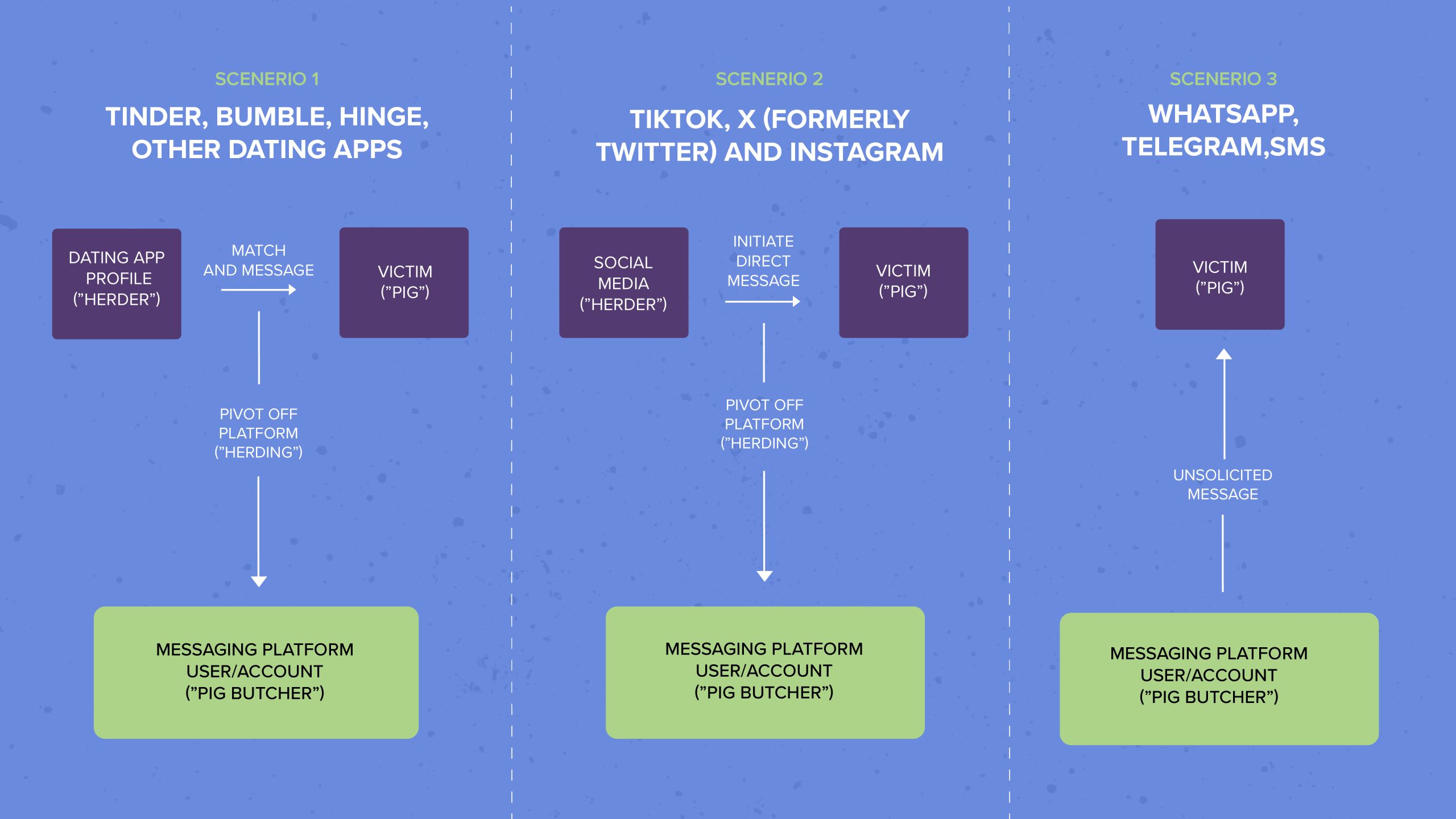What is a pig butchery scam?
A pig-butchering scam, also known as a “sha zhu pan” scam, is a sort of online investment fraud in which scammers create fictitious online personas to entice victims into fraudulent investment schemes. The term “pig-butchering” refers to the scammers’ strategy of “fattening up” their victims by gradually gaining their trust before “slaughtering” them by stealing their money.
The scam blends elements of romance and investment fraud, it is a highly profitable scheme, allowing scammers to steal hundreds of millions of dollars worldwide in recent years. However, the true extent of the damage caused by pig butchering scams is hard to measure. This difficulty arises from several factors: the overlap between romance and investment fraud, the inability to monitor transactions on platforms and mobile apps controlled by attackers, and the reluctance of victims to report these scams due to feelings of shame and embarrassment. Like social engineering, it exploits core human feelings of ‘acceptance’ and ‘connection’ to make financial gains.
How the pig-butchering scam works
- Creating a false persona: On dating apps and social media, scammers frequently construct false online personas by pretending to be seeking an old friend, gorgeous singles or affluent investors. These false personas are meticulously designed to play on the interests and weaknesses of possible victims. They will also use images that have been taken or created by artificial intelligence (AI) and made-up backstories to give the impression that they are reliable and trustworthy.
- Making contact: Scammers will reach out to possible victims using social media, dating apps, or even sporadic phone calls and messages. To start conversations and see how receptive the victim is, they could utilise pre-written messages and scripts. They frequently use a wide net approach, contacting a large number of possible victims in an attempt to identify people who are most likely to fall for their tricks.

- Earning the trust of a victim: Initially, scammers gain the trust of their victims by posing as experienced investors or educated experts. Additionally, they interact with possible victims on social networking sites and online forums, giving the impression that they are successful and credible. Another novel strategy they use is to imbue their fraud with an air of romance or camaraderie. This indicates that they take advantage of their victims’ intrinsic need for closeness and connection in addition to their drive for financial success. This stage is important because it’s the point where the “fattening” happens. In a pig-butchering scam, the “fattening” period, during which the scammers build trust and rapport with their victims, typically ranges from a few weeks to several months. Scammers invest significant time in cultivating a sense of relationship and trust, often communicating with victims daily and portraying themselves as reliable and trustworthy individuals. The length of this period can vary depending on the scammers’ strategy and the victim’s responses. The goal is to make the victim comfortable enough to invest significant amounts of money before the scam is executed.
- Making the investment proposal: Once people start to believe them, the con artists present a lucrative investment opportunity. Stocks, cryptocurrency, or other financial instruments might be involved in this. Scammers usually utilise numbers manipulation, persuasion, and an air of urgency to make their victims feel that the chance is too good to miss. A tech researcher with Tenable broke down the attackers’ tactics with text screenshots and communication styles employed to make their victims purchase cryptocurrency under the guise of investments. In some cases, the victims would even see interest payments being made to their wallets and sometimes withdraw limited amounts of it however, the funds eventually disappear at the end of the scam process. To make tracking more challenging, they frequently use cryptocurrency or digital payment platforms.

- Ghosting: The con artists will abruptly disappear from contact or experience difficulties transferring money through the brokerage platform once they have obtained a sizable payment from their victims, or when the victims attempt to take money out of the account. Additionally, scammers could change their names or remove their online presence, making it harder for victims to reclaim their lost money.
Warning signs of pig-butchering scams
- Unsolicited contact
- Refusal to engage in video chat
- Request for financial or personal information
- Romantic interest from strangers
- Pressure to invest in specific financial business
- Unknown or confusing investment opportunities
- Unfamiliar trading platforms
- Persistent attempt to isolate you from other people
- Sense of urgency about an upcoming news announcement or share price increase
What Next…?
The alarming growth in pig-butchering frauds, as well as their tragic impact on victims, highlight the importance of staying aware and cautious about scammers’ tactics and strategies. As malevolent actors continue to adapt and develop their approaches, individuals must remain vigilant in protecting themselves and their investments, especially since those new to large-scale investing are more vulnerable to such schemes. If you find yourself in an apparently trustworthy online relationship with an unknown individual who follows the scam’s tendencies, take a step back and evaluate if you are the target of such a scheme.
Moving forward, it is vital to be aware of the hazards associated with pig-butchering scams and other forms of financial fraud. Scammers participating in investment fraud are likely to change their techniques and approaches when contacting victims, but their primary purpose will stay the same: to defraud people out of their hard-earned money.
In the face of these growing risks, always be sceptical of obscure private investment opportunities and instead target well-established and mainstream ventures. This reduces the risk of falling victim to scammers and increases the likelihood of making a profit rather than losing everything.
Here are some more personal tips to help you avoid falling for pig butchery scams;
- Be careful about sharing personal or financial information online, especially with people you don’t know well. Scammers can use this information to target you more effectively or steal your identity.
- Keep your social media profiles private, and be selective about accepting friends or following requests from strangers. Scammers often use social media to gather information about potential victims and tailor their approach accordingly.
- Educate yourself about the common tactics used by scammers, such as love bombing, guilt-tripping, or creating a false sense of urgency. Knowing these manipulation techniques can help you recognize and resist them.
- Discuss your investment decisions with family and friends. Scammers often try to isolate their victims from loved ones who might question the legitimacy of the investment or express concern about the relationship. Open communication can help you stay grounded and avoid falling for a scammer’s tactics.
Sources
UNMASKING PIG-BUTCHERING SCAMS AND PROTECTING YOUR FINANCIAL FUTURE
By Trend Research (https://www.trendmicro.com/vinfo/us/security/news/cybercrime-and-digital-threats/unmasking-pig-butchering-scams-and-protecting-your-financial-future)
Pig Butchering Scam: How Bitcoin, Ethereum, Litecoin and Spot Gold (XAUUSD) Investments Are Used in Romance Scams to Steal Hundreds of Millions Satnam Narang (Link: https://de.tenable.com/blog/pig-butchering-scam-bitcoin-ethereum-litecoin-spot-gold-xauusd-romance-scam#screenshots)
Pig Butchering Scams: What They Are, Warning Signs, and How to Avoid Them ADAM HAYES (https://www.investopedia.com/pig-butchering-scams-8605501#:~:text=The%20term%20%E2%80%9Cpig%20butchering%E2%80%9D%20comes,them%20and%20stealing%20their%20money.)
https://www.linkedin.com/pulse/how-avoid-being-social-engineering-victim-pig-butchering-arun-kl
https://www.finra.org/investors/insights/pig-butchering-scams